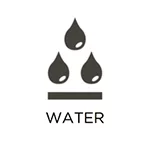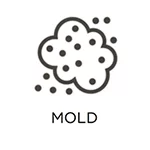RestorationMaster
Water damage may be difficult to prevent, but reacting to it quickly will help you avoid serious damage and save money on the repairs. It is possible for excess water to get into your home or building due to severe weather conditions like flooding and rain, but you can also experience water damage from internal issues like overflows, leaks, or burst pipes. Quick reaction is the key to limiting water damage because the excess water and moisture will keep spreading through your home or building until it is addressed. RestorationMaster provides water damage restoration and cleanup services to assess and restore water damage for homes and businesses in Peabody, MA. We arrive on the scene quickly to help stop the spread of the water and prevent serious issues like mold growth and structural damage.
You should never ignore any type of water damage you find on your property. Even small leaks can eventually create serious issues. Common building materials like drywall, flooring, wood, and insulation absorb water, which allows it to spread further and deeper into your home. The affected materials may become discolored or warped by the water, and they can weaken enough to cause severe structural damage. The possibility of mold growth is another concern with water damage because mold appears in areas that provide it with a moisture source. Mold will cause even more damage to the already affected surfaces and trigger allergic reactions or more serious health effects with extended exposure.
Water Damage Restoration in Peabody, MA
At RestorationMaster, we are prepared to deal with all levels of water damage in homes and commercial buildings. Our water extraction equipment can remove any amount of standing water. We can also set up specialized dying and dehumidification equipment to treat building materials and furnishings that have absorbed water. The exact method of water damage restoration and cleanup will vary from case to case, but you can expect the following basic steps:
- Water extraction and complete drying
- Restoration of damaged building materials and furnishings
- Content cleaning and restoration of your personal belongings
- Carpet, rug, and upholstery cleaning
- Mold Remediation
- Document restoration and recovery
For water damage restoration and flood cleanup in Peabody, MA, contact RestorationMaster at (781) 604-1476.
What to Do in Case of Water Damage in Peabody, MA
- Contact RestorationMaster as soon as possible to prevent the damage from spreading and causing bacteria or mold growth.
- Remove excess water by mopping or blot drying only.
- Remove rugs and other temporary flooring, but not permanent carpeting or flooring.
- Put the drapery bottoms through a coat hanger and put the hanger on the rod to keep your drapes off the wet floor.
- Wipe water from your wet furniture and put aluminum foil under the legs to prevent damage to the carpet.
- Put delicate objects like photos and valuables in a safe location.
- Leave water-damaged books close together on the shelf so that the pages do not warp. We can treat wet books with specialized drying.
- Open up the doors in your home to help with the drying.
What Not to Do in Case of Water Damage in Peabody, MA
- Do NOT enter a flooded room unless you are certain the power is out.
- Do NOT use a regular vacuum cleaner to remove water.
- Do NOT remove permanent flooring or carpeting.
- Do NOT use electrical appliances if the floor is wet or if they may be damaged.
- Do NOT try to remove mold growth yourself.
Remember, the quicker you address water damage, the lower the risk of experiencing extensive structural damage or mold growth. Our technicians at RestorationMaster can arrive less than 4 hours after your call and we provide free estimates before we start the work.

Call Us 24/7 for Emergency Water Damage Restoration in Peabody, MA
At our company, we pride ourselves on providing exceptional customer service and treating every client with the utmost care and respect. We understand that water-related disasters can be stressful and disruptive, so we work quickly and efficiently to minimize the impact on your daily life.
You can call us 24 hours a day at (781) 604-1476 for emergency water damage restoration and cleanup services in Peabody, MA, and the surrounding areas.
Related Water Damage Restoration Services
- Water Damage Removal and Restoration – Cambridge, MA
- Water Damage Cleanup In Derry, NH
- Water Extraction in Dover, NH
- Flood Cleanup Services in Manchester, NH
- Water Damage Restoration Company for Nashua, NH
- Flood Mitigation for Rochester, NH
- Water Damage Restoration Experts In Stoneham, MA
Related Water Damage Tips
The Difference Between Water Extraction and Water Mitigation
Water extraction and water mitigation are key steps in handling water damage, but they focus on different aspects of the process. Water extraction is all about removing excess water from your property. This usually involves using pumps and vacuums to get rid of standing water and prevent further issues. It’s the first step to stopping the damage from getting worse. Water mitigation, on the other hand, goes beyond just removing water. It involves drying out the affected areas, removing any damaged materials, and taking steps to prevent future problems like mold growth or structural damage. Essentially, water extraction handles the immediate water removal, while water mitigation deals with the overall damage and prevention strategies.
Repair Tips For Water Damaged Drywall
When water enters a property, it can soak into porous materials like drywall. Drywall, which is made of gypsum sandwiched between two layers of paper, is common in many homes and buildings. Because the outer layer is paper, drywall can easily absorb water, leading to problems like water stains, bulging, or warping. Follow some basic steps on how you can repair a water damaged drywall.
How to know if water damage is fresh or old?
One essential part of dealing with water damage is figuring out whether it’s new or old. Knowing this helps you understand how severe the issue is and what actions to take. In this guide, we’ll discuss ways to tell the difference between fresh and old water damage, giving you the knowledge you need to address the problem effectively.
Water Damage Cleanup Related FAQs
How long is the drying process for water damaged homes?
The drying process for water-damaged homes can vary widely depending on several factors, including the extent of the damage, the type of materials affected, the humidity levels, and the effectiveness of the drying equipment used. In general, the initial drying phase, which involves removing standing water and setting up drying equipment like fans and dehumidifiers, typically takes around 2 to 5 days. However, drying out saturated building materials such as drywall, wood, and insulation can take significantly longer, ranging from several days to several weeks.
How to prevent indoor flooding from storms?
To prevent indoor flooding from storms, here’s the list of things you need to do:
- Maintain Gutters and Downspouts
- Sump Pump Maintenance
- Foundation Sealing
- Landscaping
- Check Seals and Caulking
- Install Flood Sensors
- Elevate Utilities
How to fix water damaged drywall?
Our restoration experts have outlined a few steps for fixing a water-damaged drywall:
- Use a utility knife to cut out damaged drywall cleanly.
- Allow exposed area to thoroughly dry using fans or dehumidifiers.
- If mold is present, use a mold-killing solution and let dry completely.
- Patch damaged drywall with joint compound and a drywall patch.
- Smooth out joint compound and let dry completely before sanding.
- Prime the area, then paint to match the surrounding wall.
- Keep an eye on the repaired area for further damage or moisture.
Can I break my lease because of water damage?
If there’s water damage in your place, it might give you a way out of your lease, but it depends. How bad is the damage? Is it making your place unlivable? Check your lease to see if it mentions anything about this situation. In a lot of places, landlords have to keep their properties safe to live in, which means fixing water damage. If your landlord isn’t doing anything about it and it’s affecting your quality of life, you might have a case for breaking your lease.
Recent Reviews
Samantha Hibberd

"I called literally everyone to come out and clean the underneath of our trailer when we had a septic and water line break. No one was willing to do the job and RestorationMaster were the last people I called. It was the easiest transaction and someone was able to come that day to come look at it and they were back within a few days to get the job done. Super grateful!"
Efonthedl

"Couldn’t be happier! The folks over at RestorationMaster are knowledgeable, competent and extremely helpful. From start to finish, they walk you through the process. Explanatory and concise. They ensure the process is seamless and effortless without worry. Thank you to the entire team, especially Christine, Brianna and Roberto for your time, patience and kindness! 5 star all around!"
Michelle Glover

“They responded quickly, were respectful of our home and responsive to our requests. Services: Fire damage cleanup & repair”
Michael Long

“RestorationMaster was helpful and prompt in resolving our water damage and associated cleanup operation. Positive: Responsiveness, Punctuality, Professionalism. Services: Mold inspection, Water damage-related cleanup & repair, Water damage-related mold removal.”
Al T.

“The water supply line to our refrigerator ice-maker burst and leaked water all over the hardwood floor and into the basement. After we got a plumber to shut the water valve which was located behind the built-in refrigerator, RestorationMaster came to do remediation. Marvin and his crew measured the moisture in our walls and floors, removed the baseboards and drilled holes into the wall. They then set up equipment in our kitchen and basement. Marvin came by the next day to check on progress, moved some equipment around and then came back 3 days later to do a final check. Their actions saved our wooden floors! Marvin and his crew were truly awesome - professional, courteous and friendly throughout. Highly recommended. Positive: Responsiveness, Punctuality, Quality, Professionalism, Value. Services: Water damage-related cleanup & repair.”
Migdalia Curet-Wiggins

“Very Professional and quick response”






